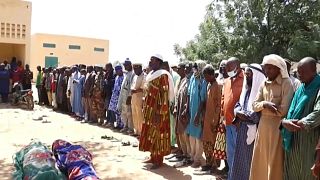United Nations
It is lack of jobs more than religious ideology that is allowing jihadist groups and other violent extremists to attract growing numbers of recruits in sub-Saharan Africa, the United Nations said Tuesday.
The findings from the survey of nearly 2,200 men and women challenge traditional assumptions about what drives people to violent extremism, according to the United Nations Development Programme (UNDP).
- Jobs, family and friends -
The UNDP relies on interviews conducted in 2021 and early 2022 in eight countries: Burkina Faso, Cameroon, Chad, Mali, Niger, Nigeria, Somalia and Sudan.
Nearly 1,200 respondents were former members of violent extremist groups, including volunteer recruits. The majority belonged to some of the most prominent groups in the region, including Boko Haram, the Shebab, and the al-Qaeda affiliated Group for the Support of Islam and Muslims (GSIM, JNIM in Arabic).
A quarter of volunteer recruits cited a lack of job opportunities as their primary reason for joining, an increase of 92% from the findings of a similar 2017 study.
"In many countries, where income and job opportunities are lacking, desperation drives people to take opportunities from anyone," UNDP boss Achim Steiner noted at a press conference.
Just under a quarter (22%) said they wanted to join family or friends.
Religion was the third reason for joining, cited by 17% of people, down from 57% in 2017. Some 40% of those surveyed cited religion as a key factor then.
In addition, nearly half of those surveyed cited a specific triggering event pushing them to join these groups with nearly three-quarters (71%) citing human rights violations, often committed by state security forces, as their "tipping point."
- New epicenter -
Terrorism deaths have declined over the past five years globally, but attacks in sub-Saharan Africa have more than doubled since 2016, the UNDP says, counting 4,155 attacks from 2017 to 2021, killing more than 18,400 people.
By 2021, nearly half of all terrorism-related deaths were in that region, with more than a third of them in just four countries - Somalia, Burkina Faso, Niger and Mali - making sub-Saharan Africa "the new global epicenter of violent extremism," Steiner says.
The UNDP notes, however, that the shift in violent extremist group activity from the Middle East and North Africa to sub-Saharan Africa has received relatively little attention from the international community, which has been preoccupied with the climate crisis, the Covid-19 pandemic, growing authoritarianism and the war in Ukraine.
"We believe there is an urgent need to try to get the attention of the international community ... to better understand how violent extremist groups manage to penetrate nations, states and communities," Steiner said.
- Counter and prevent -
"Security-focused counterterrorism responses are often costly and not very effective. Unfortunately, investments in preventive approaches to violent extremism are woefully inadequate," commented Steiner.
The report recommends greater investment in basic social services, child protection, education and quality livelihoods. It also calls for scaling up possible exit routes for recruits and investing in community-based rehabilitation and reintegration services.
"It is very important to invest in incentives, which promote disengagement," according to Nirina Kiplagat, UNDP's regional advisor for the prevention of violent extremism in Africa.
She calls on local communities to play a central role in supporting sustainable pathways out of violent extremism, alongside government amnesty programs.











01:19
MSF suspends operations in Haiti amid fresh wave of violence
02:09
Russia vetoes UN resolution calling for immediate cease-fire in Sudan
01:17
COP29 finance talks lag as the summit reaches its halfway mark
01:17
Newly appointed Haitian prime minister swears in cabinet of ministers
01:38
COP29: What next for Africa's energy transition?
01:39
Panic, displacement in Haiti's capital as gangs step up attacks